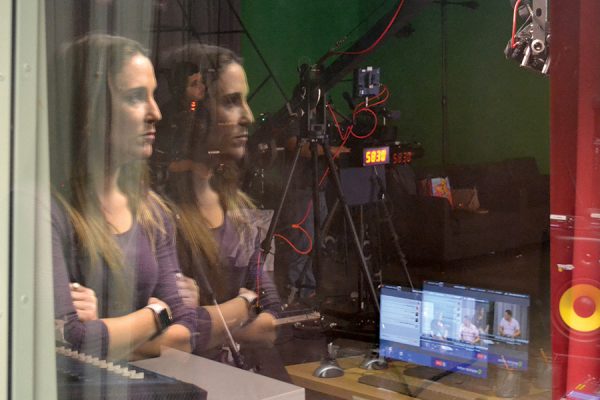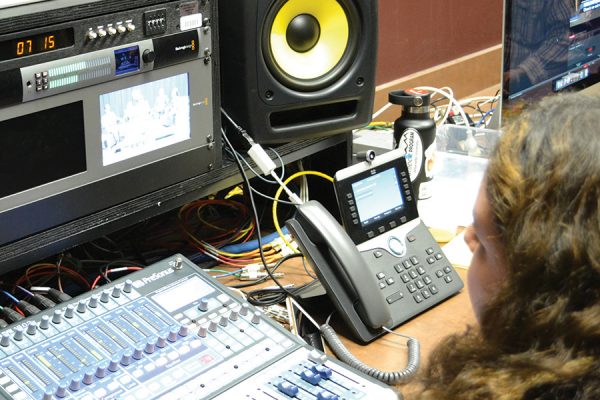Capital Community Television builds community through television by offering opportunities to learn and create.
Three flat-screen monitors adorn the wall in Kirimi Flitter’s office; one for each of the TV stations she manages. Children from an area charter school show off a handmade science display on one, while another features a warehouse full of marijuana plants.
“All of our services and equipment are available to all walks of life,” said Kirimi, 35, programming and promotion coordinator at Capital Community Television. “Making all of this available to everyone I think is important, not just people who can afford the technology.”
At 6:59 p.m., Kirimi is interrupted by a polite but urgent knock at her office door from a producer. It’s less than a minute to airtime on Channel 22. The countdown begins.
Glancing at the monitors, Kirimi reaches behind her desk for a large electronics box, and positions her hand at the controls. Five…four…three…two… Switch.
The middle screen changes over to the Latino affairs talk show CVEL Punto TV, which immediately joins the fray with a speaker at Salem City Club still on Channel 21, and the medical marijuana enthusiast holding court on Channel 23.
CCTV is on the air.

Since 1989, this TV studio and station has been one of Salem’s hidden gems, a television and multimedia production resource where members of the community can try their hand at broadcasting.
Funded entirely through Comcast cable franchise fees, CCTV is free to use for anyone in the Salem Comcast coverage area, save for a $25 fee for an introductory class after a required orientation that’s offered the first Tuesday of every month. Anyone interested gets free on-the-job training and guidance, as well as access to sophisticated production equipment. And airtime to say whatever is on their minds to an audience of roughly 55,000 cable subscribers, as long as it doesn’t involve on-air soliciting, or breaking the law.
“Our mission is to provide community information, build community through television, and to teach people how to make their own television messages,” Kirimi said. “We’re a platform for people to express themselves.”
It’s an especially vital platform in the case of Salem, according to Kirimi.
“We’re the largest capital in the nation without a local broadcast affiliate,” she said.
In 2008, CCTV expanded beyond its windowless basement space in the Salem Public Library to its current digs on Trade Street. Today it is made possible by 10 full-time and 3 part-time staff as well as roughly 100 volunteers, who produce shows in-studio or operate cameras at various local high school events and civic functions across the city.
And by creative citizens like you.
Across the channels, there are a wide range of unique voices.
“That’s a huge part of what this place is,” Kirimi said, “experimenting with creativity.”
Sometimes, CCTV volunteers can discover more than their voice. According to Brian Hart, 43, a motion graphics designer and occasional host of Channel 23’s long-running film review show Reel Film Snobs, CCTV opened the door to his dream of a career in video.
For 15 years, opportunities to work in film and TV were few and fleeting for him, chances he’d chased in his spare time while working at Roth’s Fresh Market. It was thanks to CCTV that he was able to land his current position as a video producer at Allied Video Productions.
“There’s no doubt in my mind,” he said.
The best part about the station, he said, is that it provides the kind of technical skills, equipment, experience, and education that you can usually only get in college. “That kind of experience costs a lot of money or isn’t available at all.”

For the Mendozas, CCTV has been a family affair: Husband Luis produces the weekly show CVEL Punto TV, which his wife Cici hosts every Friday night and his brother serves as cameraman.
“CCTV’s a great place for people like myself,” said Luis, 41, “I was born in Mexico, so I’m not originally from here, and I think this place is great because it gives me a voice so I can show other people, other cultures, what it is we do around here.”
For both the Mendozas, video has been a lifelong passion. For Luis, any chance he could get he would grab his camera and make and edit recordings of quinceañeras and other special events for his family. For Cici, she grew up competing on television talent shows like Siempre Sabado in her hometown of Mexico City.
And being on television was a dream she had put aside in her adulthood in order to pay the bills and raise her family. In that regard, the show has not only been a gift to her, but also a resource for the local Hispanic community, she said.
One example of the show’s impact stands out for Cici. It involved a guest on the show who was speaking about how to achieve business success in the Latino community. As they broadcast, a viewer chimed in on social media with multiple questions. Eventually, the guest started talking directly to the viewer, a woman in New Jersey who wanted to leave her relationship and start a business of her own. The woman had no prior experience and limited financial means, but in that moment her plight mattered to a lot of people.
In CCTV, “I found a place where we can do something,” Cici said.
“I really like seeing people get creative with their message, and I like the sense of pride that people take in what they’re putting out there,” Kirimi said, “how important everyone’s message is to them, and how important this place is.”
Incidentally, it’s a place Kirimi also discovered by luck, after being laid off by the North Salem School District in 2011.
“I was so devastated, and I landed here kind of by accident, and wasn’t overwhelmingly excited about it,” she said.
“Over the years, I’ve fallen in love with the idea of this place and made a lot of friends and learned a ton of new skills. This has been a great place for me to figure out what I want to do with my life.”
Sitting at her desk, Kirimi recalls one individual with special needs who comes in every week to do a show. He doesn’t have a crew, so the station just produces the show for him. He just sits and talks to the camera about whatever is on his mind.
“It makes him so happy. He loves it,” she said. “I know that it makes a really profound impact on his life.”
As Kirimi stares at her TV feeds, she pauses for a second.
“But I guess that’s true of most of these people,” she said. “They come in and we’re supportive of them. It doesn’t matter what their message is, we’re going to give them the same help and support that we give anybody else.”
This story originally ran in Press Play Salem issue 4 (Dec 2018/Jan 2019)

















